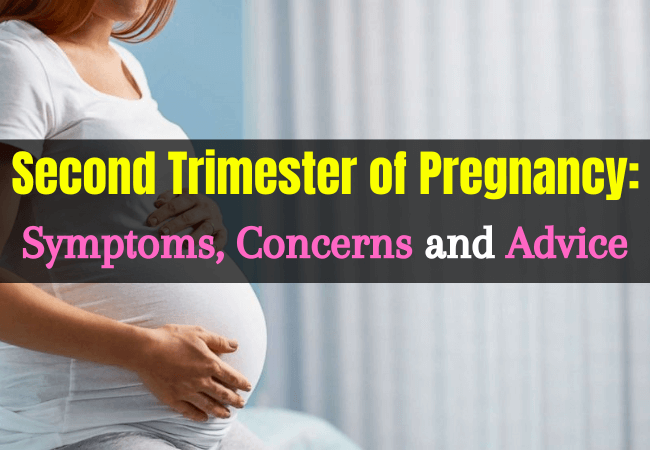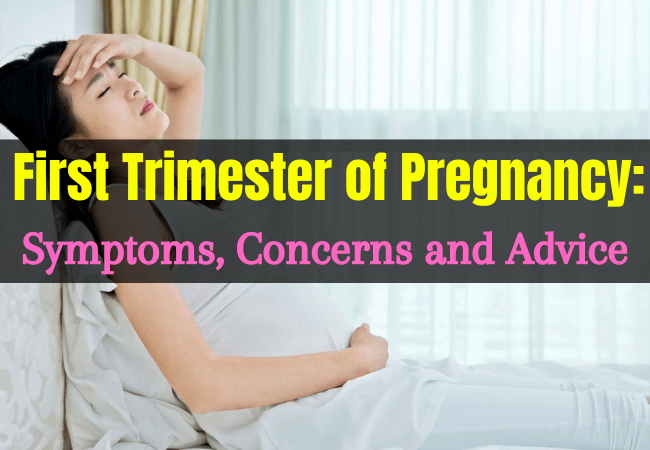Signs, Symptoms of Pregnancy and Confirmation Test
Most Common Signs and Symptoms of Pregnancy:
The most common early signs and symptoms of pregnancy might include:
- Missed period.
- Tender, swollen breasts.
- Nausea with or without vomiting: Morning sickness, which can strike at any time of the day or night, often begins one month after become pregnant. However, some women feel nausea earlier and some never experience it.
- Increased urination: The amount of blood in body increases during pregnancy, causing kidneys to process extra fluid that ends up in bladder.
- Fatigue.

Other Pregnancy Signs and Symptoms:
Other less obvious signs and symptoms of pregnancy that might experience during the first trimester include:
- Bloating,
- Light spotting,
- Moodiness,
- Cramping,
- Constipation,
- Food aversions,
- Nasal congestion.
You can also read: Teenage Pregnancy: Causes, Effects, Risks, Consequences, Prevention, Control
Signs and Symptoms of Early Pregnancy:
It includes-
- Food aversions,
- Mood swings,
- Abdominal bloating,
- Frequent urination,
- Fatigue,
- Sore breasts,
- Light bleeding or spotting,
- Nausea,
- A missed period,
- High basal body temperature,
- Positive home pregnancy test.
Dangerous Signs in Pregnancy:
Danger signs during pregnancy includes:
- Vaginal bleeding,
- Convulsions/fits,
- Severe headaches with blurred vision,
- Fever and too weak to get out of bed,
- Severe abdominal pain,
- Fast or difficult breathing.
If she has any of these signs she should go to the health Centre as soon as possible:
- Fever,
- Abdominal pain,
- Feels ill,
- Swelling of fingers, face and legs.
Confirmation Test for Pregnancy or Types of Pregnancy Test:
It includes-
a. Urine test:
A urine test can be done at the doctor’s clinic or at home. Home urine test for pregnancy is convenient and about 97% accurate.
b. Blood test:
Though blood tests are more accurate and can detect pregnancy earlier than urine tests they are used less often. There are following types of blood pregnancy tests:
- Qualitative hCG test: It simply detects the presence or absence of hCG as early as 10 days after a missed period to confirm whether women are pregnant or not. It may not detect pregnancy until three or four days after implantation.
- Quantitative hCG test: It measures the amount or concentration of hCG, even very low levels, in the blood. Problems like ectopic pregnancy may be detected with this test.
- Detecting early pregnancy factor (EPF): Within 48 hours of fertilization, a protein called early pregnancy factor (EPF) is produced. Detecting this protein in the blood is the earliest but expensive and time-consuming way to determine pregnancy.
c. Ultrasonography:
Ultrasonography may be used to visualize the fetus in the womb at around four and a half weeks after last menstrual period (LMP). It can tell how many weeks women are into pregnancy and how healthy the baby is.
There is several ways to confirm pregnancy. These are –
- Biochemical Pregnancy tests to assess presence of human chorionic gonadotropin (hcG). This hormone is produced by the trophoblast and begins to be produced on the day of implantation hcG can be detected in the blood 6 days after conception, and in urine 26 days after conception.
- The gestational sac can be seen with a transvaginal Ultrasound at 4-5weeks; and by trans abdominal Ultrasound a week later.
- The Fetus can be palpated and fetal movements felt form about 22 weeks.
- Urine test at home with a home pregnancy tests (HPTs).HPTs are highly accurate if used correctly and at the right time. The user holds a stick in the urine stream. Collecting urine in a cup at the morning and then dipping the stick into it and wait a few minutes then inspect the result.
Various Ways to Confirm Pregnancy (At a Glance):
It includes the following:
- Missed periods,
- Nausea and vomiting,
- Bloating,
- Frequent urination,
- Back pain,
- Headaches,
- Irritability or mood swings,
- Food aversions/cravings,
- Sore breasts and tingly nipples,
- Fatigue and sleeplessness,
- Bleeding gums,
- Palmar Erythema,
- Nasal congestion,
- High basal body temperature,
- Low sexual desire,
- Pigmentation,
- Dark line of hair on the body,
- Acne,
- Itching sensation on the skin,
- Spider veins,
- Dry skin,
- Enlargement of uterus,
- Spotting.
More questions related to this article:
- Describe the signs and symptoms of pregnancy.
- What are the signs and symptoms of pregnancy?
- What are the ways to confirm pregnancy?
- How to confirm pregnancy in home?
- Mention the symptoms of early pregnancy.
- What are the signs of early pregnancy?
- What are the dangerous signs in pregnancy?
- Write down the dangerous signs of pregnancy.
- List the common problems in pregnancy.
- Write down the confirmatory test for pregnancy.
- List the types of pregnancy test.
- Mention the confirmation test for pregnancy.
- How to confirm a pregnancy?











